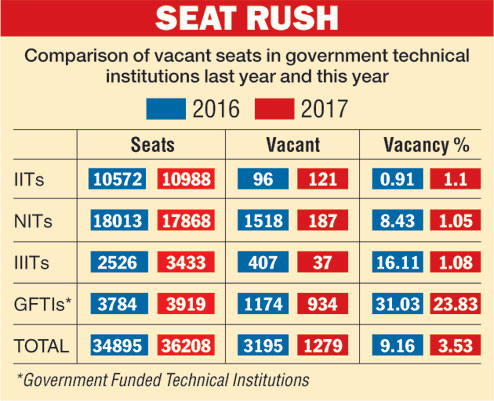
New Delhi, Aug. 7: The National Institutes of Technology have achieved almost 99 per cent admission to their BTech courses this year after the government relaxed the eligibility criteria for Northeast students and opened up the vacant domicile seats across the country.
Of the 17,868 seats available across the 31 institutes, only 187 remain vacant after a special round of online counselling was held on July 31 on the basis of the revised norms. Over 1,500 seats were vacant last year.
Some 3,200 seats had been vacant this year before the government relaxed the norms, which means over 3,000 extra seats have been filled.
"To fill the remaining seats, the NITs and other technical institutions will hold a spot round," an NIT Council official said.
In the spot round, to be held till Wednesday, students who meet the norms but have so far not sought admission to the NITs, perhaps favouring other private or government colleges, would be free to walk into a preferred NIT and seek a seat on a first-come, first-served basis.
Besides, the Other Backward Classes seats would be opened up for general category candidates in this round, although the Scheduled Caste and Scheduled Tribe quotas would not be.
Of the 187 vacant seats, however, 61 lie with NIT Srinagar, which outstation students have tended to avoid for security reasons. Most of these are likely to remain vacant. All the seats at NIT Durgapur have been filled.
Former NIT Rourkela director Sunil Sarangi said that if vacancies remained despite norm relaxations, "the Scheduled Caste and Scheduled Tribe seats should be converted to non-reserved seats so that seats don't go waste".
He said that although government rules don't allow jobs reserved for Dalit and tribal candidates to be given to people from other sections, the same practice should not be followed in education because seat vacancies are a sheer waste.
According to the government's estimates, the operational cost for one BTech student at an NIT comes to about Rs 3 lakh a year.
Government Funded Technical Institutions like the Gurukul Kangri Vishwavidyalaya, the Institute of Technology at Guru Ghasidas University, and the Sant Longowal Institute of Engineering and Technology recorded huge vacancies.
A general category student needs to score 75 per cent in his Class XII board exams, and a Scheduled Caste or Scheduled Tribe student needs 65 per cent, to be eligible for admission to an NIT.
In the last week of July, these cut-offs had been lowered to 45 and 40 per cent, respectively, for students from the Northeast for admission to the domicile seats at the NITs in their region, where the vacancies were highest. (Half the seats in every NIT are set aside for home state candidates.)
Once this was done, the government declared that all the home state seats at every NIT across the country would be treated as all-India seats, with no domicile restrictions.










